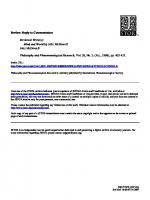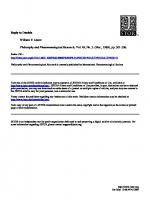
- Author / Uploaded
- Quine W V
Reply to Professor Ushenko
Willard V. Quine The Journal of Philosophy, Vol. 39, No. 3. (Jan. 29, 1942), pp. 68-71. Stable URL: http://links.jstor.
1,172 14 124KB
Pages 5 Page size 595 x 792 pts Year 2007
Recommend Papers
File loading please wait...
Citation preview
Reply to Professor Ushenko Willard V. Quine The Journal of Philosophy, Vol. 39, No. 3. (Jan. 29, 1942), pp. 68-71. Stable URL: http://links.jstor.org/sici?sici=0022-362X%2819420129%2939%3A3%3C68%3ARTPU%3E2.0.CO%3B2-5 The Journal of Philosophy is currently published by Journal of Philosophy, Inc..
Your use of the JSTOR archive indicates your acceptance of JSTOR's Terms and Conditions of Use, available at http://www.jstor.org/about/terms.html. JSTOR's Terms and Conditions of Use provides, in part, that unless you have obtained prior permission, you may not download an entire issue of a journal or multiple copies of articles, and you may use content in the JSTOR archive only for your personal, non-commercial use. Please contact the publisher regarding any further use of this work. Publisher contact information may be obtained at http://www.jstor.org/journals/jphil.html. Each copy of any part of a JSTOR transmission must contain the same copyright notice that appears on the screen or printed page of such transmission.
JSTOR is an independent not-for-profit organization dedicated to and preserving a digital archive of scholarly journals. For more information regarding JSTOR, please contact [email protected].
http://www.jstor.org Sun Jun 17 05:05:33 2007
T H E JOURNAL O P PHILOSOPHY
68
REPLY TO PROFESSOR USHENKO
R
EFERRING to the examples :
(1) Jones is ill, (3) Jones is not ill, (4) "Jones is ill" is false.
Professor Ushenko rightly asserts (p. 65) : [i]
Dr. Quine believes that (3) and (4) are different statements.
Nor is my belief easily shaken; I have only to observe that (4) is longer than (3), or that (4) contains an occurrence of "a" while (3) does not. I n taking the word "statement" as applying thus to sheer verbal forms, viz., declarative sentences, I am supported by Professor Ushenko's second footnote ; it is rather the word "proposition" that applies to the abstract entities (if any) whereof statements are names. Still, if instead of [i] Professor Ushenko meant to say: [ii]
Dr. Quine believes that (3) and (4) designate different propositions,
I can only reply that I believe no such thing; on the contrary, I have been quoted by Professor Ushenko himself (same footnote) as wondering "under what circumstances . . the entities designated by two statements [may] be said to be the same or different entities. " But instead of speaking of statements as designating the same proposition, we may, Professor Ushenko suggests (same footnote), speak of them as equivalent. Now [ii] may be rephrased to avoid the controversial term "proposition " :
.
[iii]
Dr. Quine believes that (3) and (4) are not equivalent.
However, I do not recall having expressed such a belief. Nor do I know what sense of "equivalent" Professor Ushenko has in mind; but I venture to say that if I knew, I should agree that (3) and (4) are equivalent. If Professor TJshenko meant [iii] when he wrote [i], then surely when he wrote (p. 64) : [iv]
According to Dr. Quine's theory, ( 3 ) must be distinguished from (4) on the grounds that the former is a statement about Jones and the latter is a statement about (1)
he meant : [v]
According to Dr. Quine's theory, (3) must fail of equivalence with (4) on the grounds that the former is a statement about Jones and the latter is a statemeut about (1).
REPLY TO PROFESSOR USHENKO
69
However, I can not accept [v]. I see no reason why equivalence of (3) and (4) should be incompatible with diversity of the things that (3) and (4) are about. Light is wanted, of course, on the intended senses of " equivalent " and "about. " Again, Professor Ushenko writes (p. 64) : I f (3) and (4) a r e really different statements, i.e., if they do not mean the same thing, then one must decide between them, because of the logical principle t h a t no proposition "p" can have more than one contradictory. I am not sure whether (3) and (4) have different meanings.1
...
As must be clear by now, I do not claim that (3) and (4) "do not mean the same thing" (whatever that may mean) ; so my position creates no special need of "deciding between" things for purposes of Professor Ushenko's "logical principle." But this has little to do with the obvious and trivial circumstance that (3) and ( 4 ) are really different statements.
Professor Ushenko misunderstands me when he writes (p. -) [vi]
Dr. Quine that. "
. . . rejects the usual
reading of
"
4,"
:
" I t is false
On the contrary, I agree with Les'niewski that "it is false that" is an admissible reading of " r~ ," perhaps even preferable expositorily to the etymologically more immediate reading "not" in one minor respect: viz., in matching " 4 " on the score of initial p ~ s i t i o n . ~Still I find Professor Ushenko's own objection (p. 67) to the reading "not" unconvincing : I n order t o justify [the] transformation [of "Jones is not away" into is away"] Dr. Quine must stipulate that i t does not change t h e syntactical nature of the original statement.
" +Jones
I prefer to consider that the prime virtue of logical notation is that it does change syntax, supplanting statements whose syntax is complex and chaotic by statements whose syntax is simple and systematic. Further, it is a mistake to suppose that there is only one reading of " 4 " or of " 4 Jones is away"; this last has many interchangeable readings, among them "Jones is not away," "Jones isn't away, " "it is false that Jones is away. " 1 I n passing I must deplore the formulation "no proposition ' p ' "; f o r is not a n unspecified proposition, nor even a n unspecified statement, but oily a letter. his seemingly minor point is curiously crucial in semantics; cf. Tarski, Der Wahrheitsbegriff in den f ormalisierten Sprachen, " Studia Philosophica, Vol. I (1935), pp. 272 ff. We may of course say "no proposition p," if a sense has been given t o "proposition"; also "no statement "no object s," etc. 2 llUeber Definitionen in der sogenannten Theorie der Deduktion," Comptes rendus Soc. Sci. Lett. Varsovie, Classe 111, Vol. 24 (1931), p. 294. 3 Cf. my Elementary Logic (Boston, 1941), p. 12. "p"
+,"
70
T H E JOURNAL OF PHILOSOPHY
The reading of " + " that I actually do reject is not "it is false that, " as claimed in [vi], but rather the shorter reading "is false"; or, more accurately, the notion that the prefixing of " + " amounts to the suffixing of "is false." For " + " is properly prefixed to a statement whereas "is false" as I use it is suffixed to something other than a statement, viz., a name of a statement. The distinction between statements and names that designate those statements is indeed the central theme in that portion of my kfathematical Logic with which Professor Ushenko takes issue. I hesitate to believe that he questions this distinction. He may regard a statement as a name in turn of something or other (as I do not), but there remains the distinction between a statement and a name of that statement itself. Yet, strange to say, i t is neglect of this very distinction that seems to have given rise to Professor Ushenko's curious conception of my views. He writes (p. 64) : We can use the symbol "p"
for any of these statements.
Does he mean to use the letter "p" in the r81e of one of the statements, or in the r61e rather of a name of one of the statements? His next sentence leaves us in no doubt: [vii]
Let us use it to designate (1).
Thus "p" is to be used in the r81e of a name of the statement (1). But, he proceeds to ask, which of the remaining statements is then symbolized by
' --. p "7
Answer: none. The denial sign " + " is not to be prefixed to names of statements, but rather to statements. If Professor Ushenko wants the letter " p " to designate the statement (11, he can not coherently write " + p"; but he can quite properly write "p is false," which is perhaps equivalent, in one or another reasonable sense of the term "equivalent," to ( 3 ) and (4) alike. Or was [vii] inadvertent? Does Professor Ushenko really want the letter "p" to abbreviate the statement ( I ) , and thus to play the r81e of that statement itself, instead of designating the statement (1) and thus playing the r81e of a name of that statement? This alternative decision extrudes the combination "p is false" and reinstates " + p," which may be pronounced "not p" or even "it is false that p," and is again perhaps equivalent, in one or another reasonable sense of the term, to (3) and (4) alike. To sum u p : a main concern of Professor Ushenko seems to have been to defend the equivalence of (3) and (4), and again the interchangeability of " + " with "it is false that,'' on the mistaken 4
Mathematical Logic, pp. 27 f.
PHILOSOPHY IN W A R TIME
71
supposition that I questioned these things. Actually what I had insisted on was the difference between "not" and "is false." Application of "not" (or " + " or "it is false that") builds statements from statements, while application of "is false'' builds statements from names-e.g., from quotations. The crucial distinction is the distinction between statements and their names. Professor Ushenko has not, however, contested this distinction; on the contrary, he has disregarded it. WILLARD V. QUINE. HARVARD UNIVERSITY.
PHILOSOPHY IN WAR TIME
Der Richter Gesellt sich
der nicht strafen kann endlich zum Verbrecher,
says Goethe, and the "Treason of the Intellectuals," as Julien Benda called it, is now widely recognized as the normal conduct and obligation of the scholar. This is inevitable with the increasing totalization of national enthusiasms. I n a time when war was a game of kings, philosophers could remain apart; now when ideas are weapons, the philosopher has become a spiritual munitions maker. We all know what happened to philosophical objectivity in the last war, and many of us are concerned now to know how love of wisdom comports itself with hatred of the common enemy. I wish to put down a few more or less random considerations of the r61e of philosophers in national rivalries in general and in this war in particular. I do not need to criticize the writers of the philosophic demi-monde who have recently discovered that the underlying national socialist philosophy is at one with the Japanese world-view ; they are, I think, the same individuals who were lately pointing out the underlying identities of communism and national socialism, now mercifully forgotten. I wish rather to consider three topics in a more positive way: (1) the question of the intellectual backgrounds of the war, (2) the relation of philosophy to politics in recent Germany, and ( 3 ) the specific nature of politico-philosophic controversy in times of war. (1) There is a "philosopher's fallacy" every bit as dangerous as the psychologist's fallacy defined by William James. I t consists in post hoc-where the hoc is some philosophical work. Thus it is easy to find Hitler to be a "follower" of Fichte, Hegel, Nietzsche, and Spengler.









